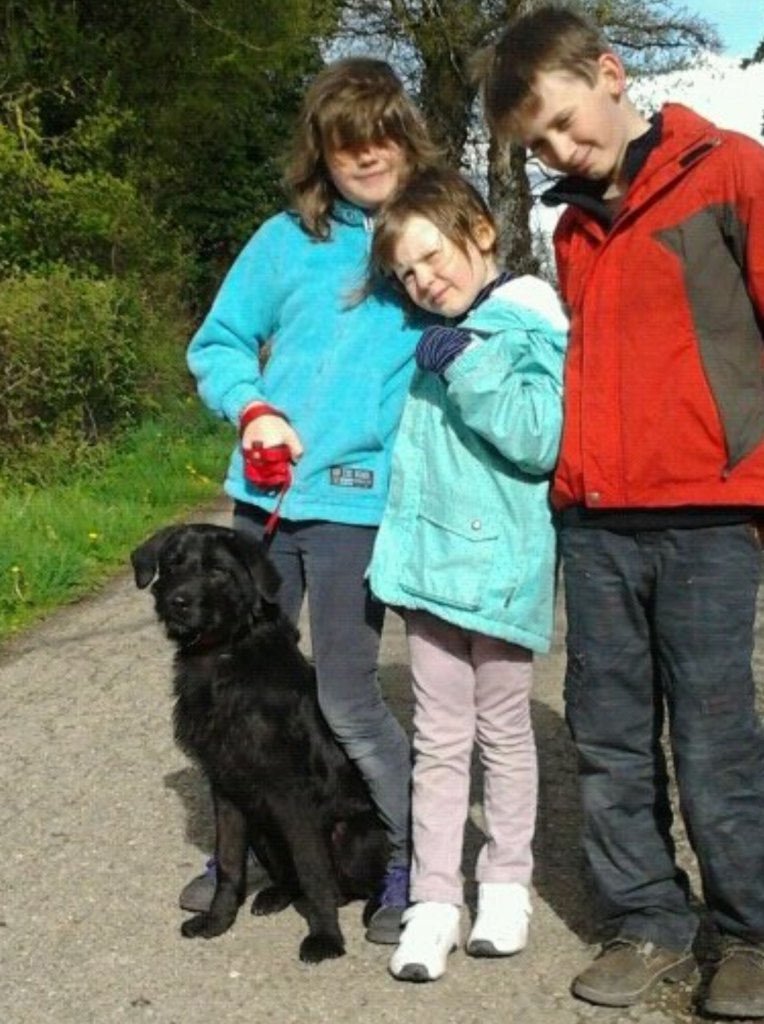
Photos my own – main photo with Ben, Megan and Julia, the day Black arrived – 22 April 2011
23 April 2024
A long, long time ago, back in the last millennium when many more species (if not exactly dinosaurs) still roamed the earth, I read “My Family and Other Animals” by Gerald Durrell. Even at the tender age I was (pre-teen?), I remember loving the book. I particularly loved the title. Coming from an often overwhelmingly large family of seven (eight including our au pair! nine including our cat!), and well before any obvious indications of my future interest in psychology and human behaviour, I am sure I recognised my own family’s behaviour in Gerald’s stories. I think I might re-read it now that it’s come back to mind. I know his stories are timeless. As an adult, I loved “The Aye-Aye and I” which made for beautiful reading during our family’s volunteering holiday in Madagascar, back when our family was intact, in 2011.
More recently, but still a few years ago, I began noticing the language “more than human” used in reference to, well, the “more than human beings” on our planet. “More than human” as in “all living organisms – including mammals, insects, reptiles, birds, plants, trees, and more”. “More than human beings” as opposed to “non-human” or, god forbid, “less than human” beings.
I love it when language changes, shifts, evolves. And I love how those small, yet significant, words can shift unconscious assumptions and beliefs.
The phrase, “more than human”, makes me more attentive to and curious about all forms of life around me. I find the language inspiring and elevating – in that it wipes out (most of my) pre-conceived notions and short-hand assumptions about “humans cf other beings”. That tiny shift in words helps to convey the immeasurable intrinsic value that all species have just for being who they are. It also conveys something of the extraordinary wisdom, capacities, resilience and skills that so surpass those of we humans. I like that the language interrupts the brain’s usual circuits – puts a bit of a speed bump in the usual rapid fire neural processing that, too often, we/I don’t challenge.
The language makes all the more sense when contemplating just how and why it is that we grieve so much when our family/domestic pets die. Before all of my human losses, I hadn’t given much thought to pet loss, even though I had had pet loss as a child. We had numerous cats while we were kids growing up – all much beloved … Tinker, Ludwig and Livy…
Livy, the kitten of my best friend’s cat, died at the grand age of 18, some years after I had left home, when only dad was still living in our Brussels house. We learned the news in one of dad’s famous “famlets” (photocopied six times and sent by post – no internet back then! – to all six members of the family living anywhere from London to Sydney, via Budapest). The letter began “Livy fuit”, and, good Latinists all of us, we all knew instantly what had happened.
Twelve years ago yesterday, 22nd April 2011, (I know because a Facebook reminder told me so), we brought home our black dog Black and our black cat Shishmi from the nearby animal refuge. Mike had wanted a dog, and the girls sided with him to get a dog. I wanted a cat, and Ben sided with me to get a cat. And somehow, against my better wisdom, we came home with both. In addition to our already full house of three children, two parents, and one au pair, we now had one cat and one dog.
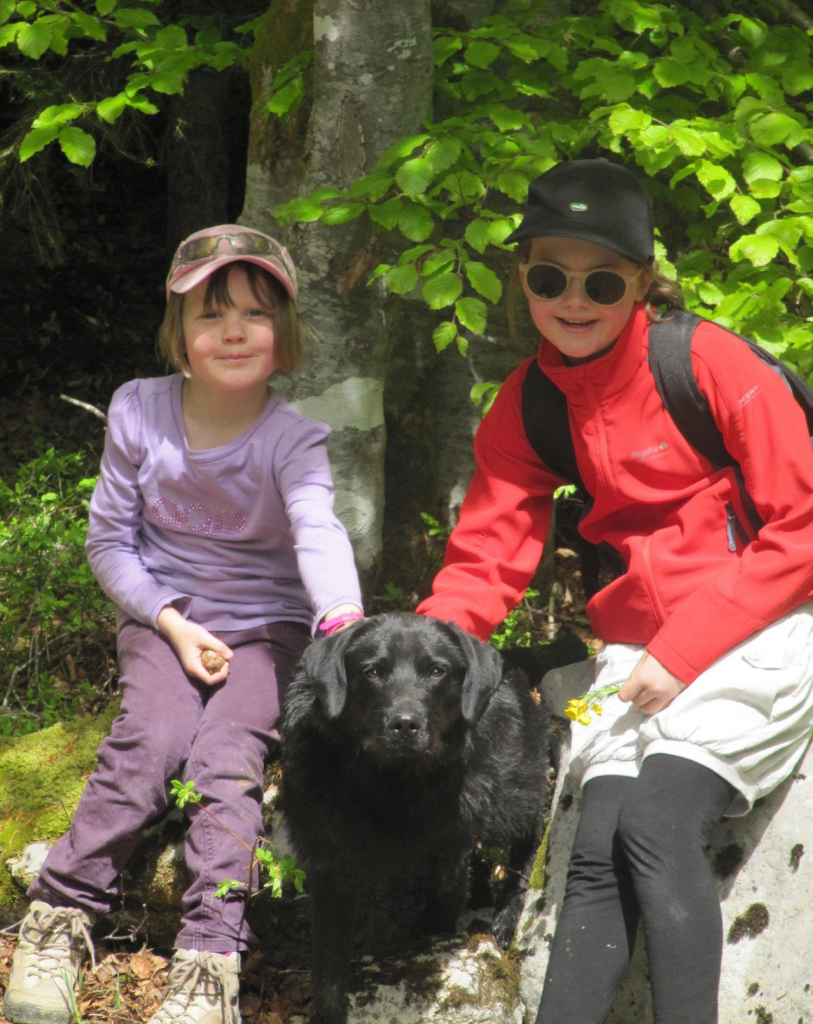
Back when Black was Black – with Julia and Megan – 2012
Within days, I confessed to Mike the dog-lover, “Erm, so – I love the cat, but I am in love with the dog”. To which Mike triumphantly exclaimed, “See!!!!” He’d so long tried – and failed – to explain the difference between dog love and cat love. It went something like this:
Mike: “Dogs are loyal. Dogs are there for you. Dogs need you. Cats – well – puh! They just come and go. No loyalty!”
Emma: “Ah – but that’s what I love about cats! No obligation. Easy love. Affection but no demands. I don’t want the work of a dog. I don’t need another being that needs me. Puh!”
And so it went on and around and about. We were truly on different wavelengths when it came to what we loved and wanted in a pet.
Until Black the dog arrived in our lives. And I found I was in love with him. Yes – I still loved the cat. But the dog? Oh my!
And so it has been for the past 12 years, and especially these last seven, as the house dwindled from six to five to four to three to two to just me.
Boarding school for one.
Death for another.
Gap year then university for another.
Another family for our final au pair.
And finally Death for another.
By 2019, just me and the dog, and a new cat left to roam these rooms.
Me and Black the dog.
Black the dog and me.
The cat Silver gets love and attention, but the dog gets my time, verbalised outbursts and declarations of love. And his fur soaks up tears. Often. Still.
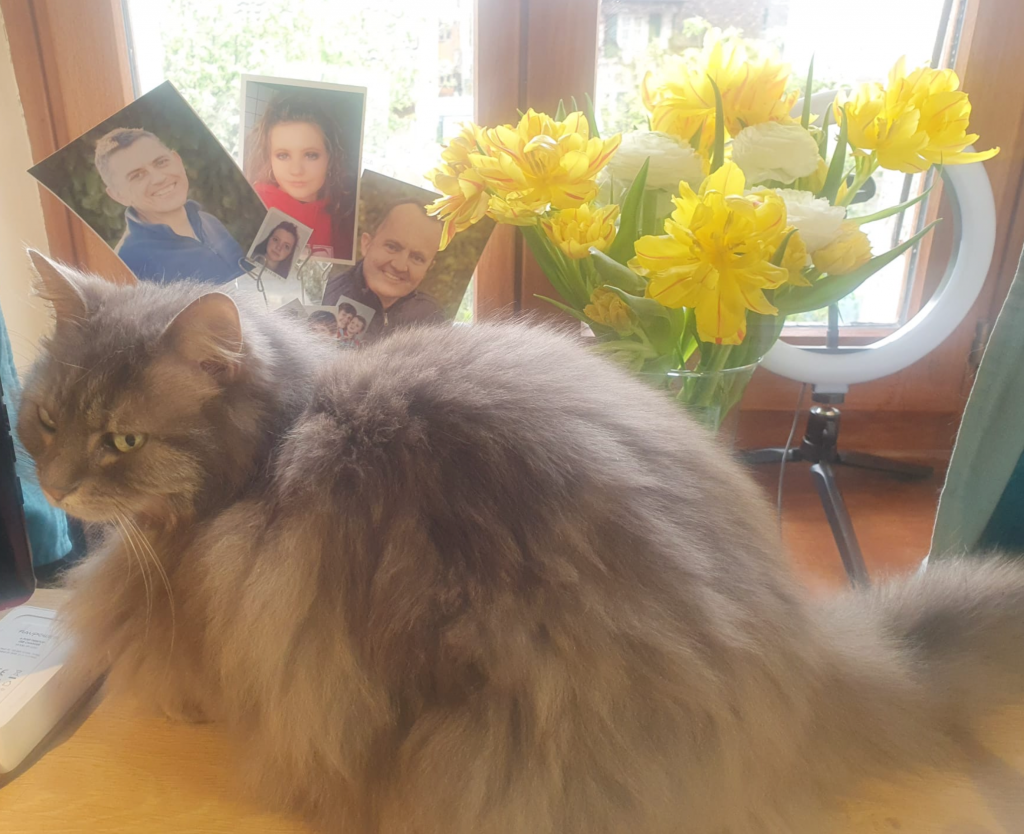
Beautiful, luscious, luxurious Silver – and my loved ones, breathing and not breathing
I’ve often written about how I experience anticipatory grief around his eventual, not-too-distant-future loss. He’s 13. He’s slowing down, and more quickly than I am. He’s more white and grey than black. His doggy face so different to these early photos from 2011 and 2012.
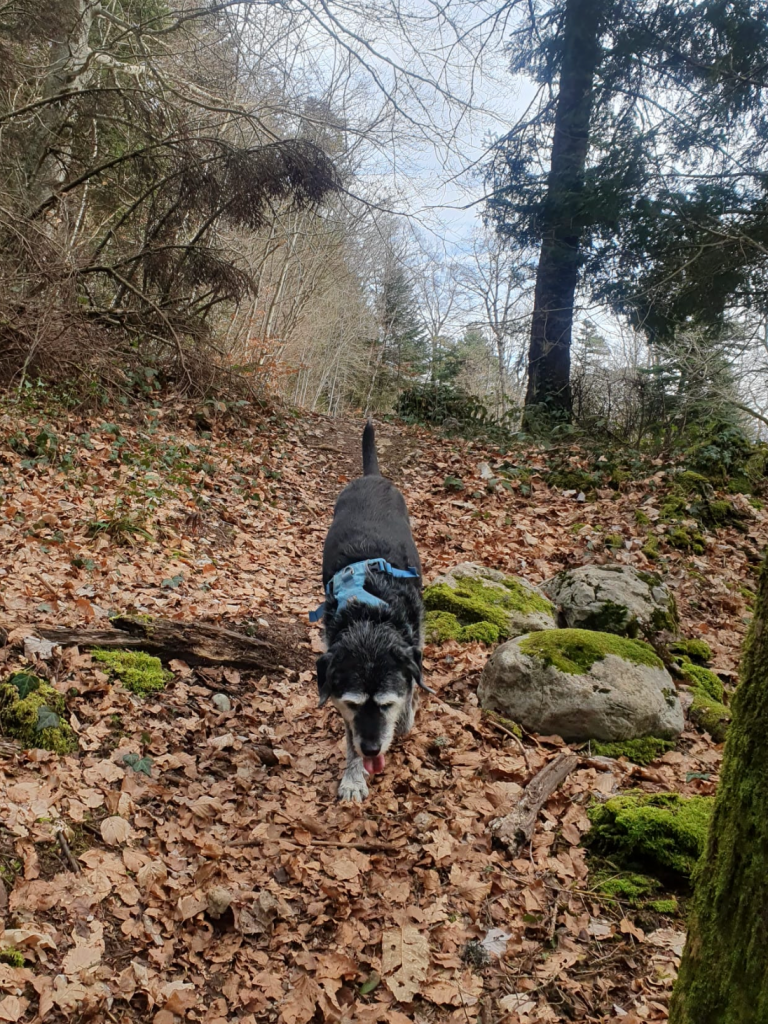
Black accompanying me on a gentle jog in the woods near where I live. He hasn’t wanted to go on a run since – so this might have been my last run with him.
He’s companionship.
He’s a reason to get up every day.
He’s a reason to come home after not too long.
He’s a reason to get out in the fields and forests.
He provides structure and rhythm, punctuating my day with his needs, which are predictable and soothing.
He’s warmth on my feet when I sit on the sofa, or under the kitchen table as I sit down to eat.
He’s an excellent pre-washer for dirty dishes and pans.
He’s safety and reassurance in this big old house.
He’s calming and therapeutic and I get to flood my system with oxytocin more often than a non-nursing woman usually gets to.
He’s a core part of my life, my way of living, and therefore my identity. I am a dog person now, as well as a cat person.
But most of all, he’s the single remaining connection to my past life, to my family when it was whole and intact. Our noisy, loving, chaotic household, memories of which hang on an increasingly thin and tenuous thread.
Black is my still living link to memories and people, to times gone by.
I know it’s going to be cataclysmic when he dies. Of course it is.
Yes, because he’s a dog, my dog, our dog, and because dogs just do that to people.
But mostly because of all the love and loves he represents. All of that history. All of that loss on loss that will get relived, remembered, re-membered.
It will be brutal.
And so I have something of an inkling for the experiences of my four friends who, in recent weeks, have experienced the deaths of their beloved cat and dogs. I can sense into something of how it must feel – partly because I know loss, partly because of knowing what happens when an attachment bond is severed, and partly because of knowing just how visceral the presence of absence, the absence of presence, is.
I want these friends – and their families – to go gently. Not to belittle the loss. Not to feel, “Who am I to be sad about losing a pet? It could be so much worse”. But to honour the grief and the love that the pain represents. To honour their humanity, and their evident connection with the more than human world, their interconnectedness with the natural world, that we too often deny.
In memory of Tolly, Laika, Phoebe and Rufus. Thank you for all the love and joy you brought to so many.
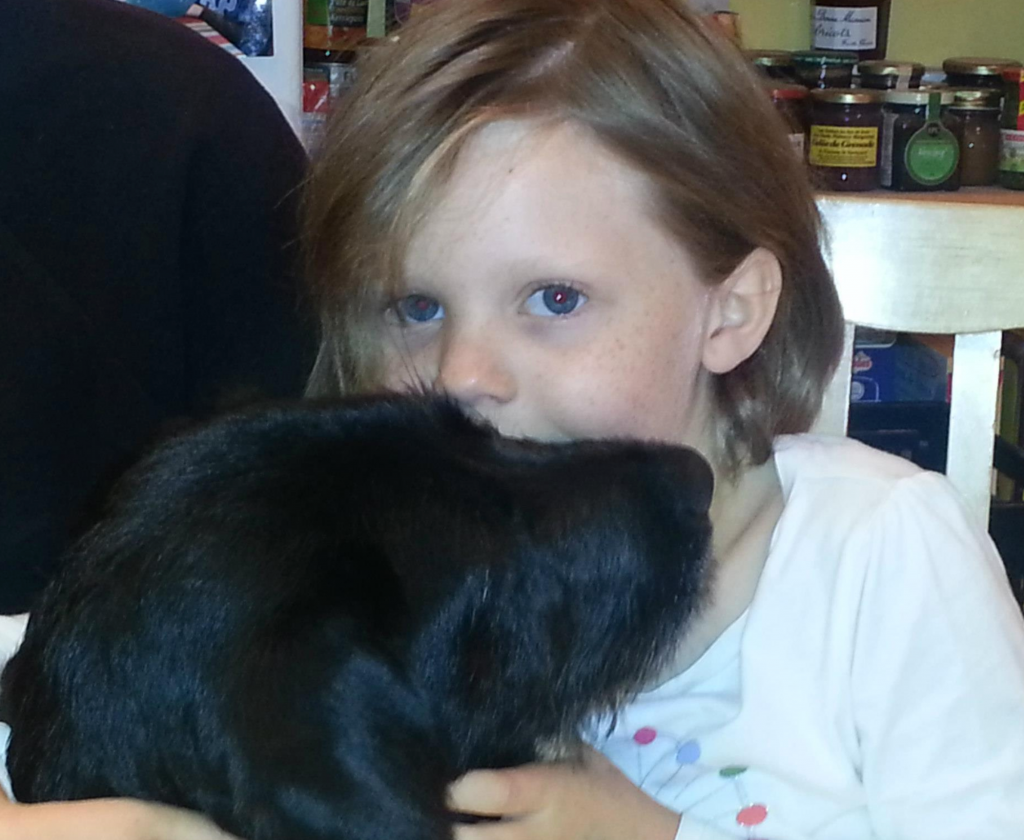
Sweet Julia with Black in 2012 – she weighed a fraction of Black’s weight when he came into our lives. And yet, she managed him better than any of us. She loved him better than all of us, too.


I adore this expression of love you’ve written. Thank you for thinking of Rufus with this dedication and of me. And for all your ongoing care. It’s a heartfelt care. It makes me feel more connected during a lonely time. It makes a difference. Your words make a difference. Xxx
Every single word resonated with me. What a special and wholly deserving tribute 🩷
“(…) the presence of absence and the absence of presence”: your words capture the harsh landscape of grief so well.
I’m glad that Julia experienced this deep and full of love bond with Black. And I’m glad you have this photo, which shows it so well.